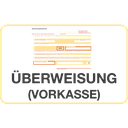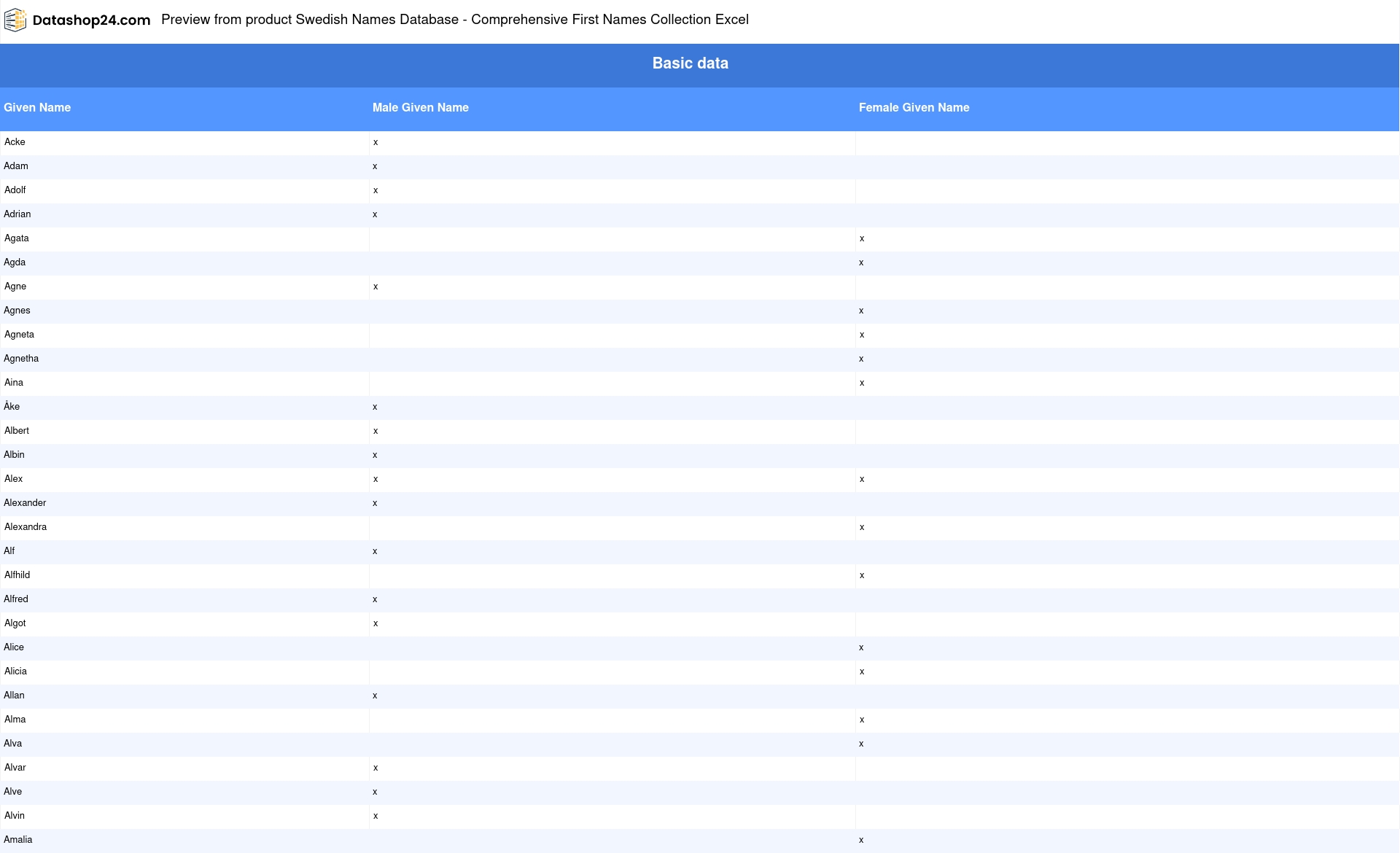Swedish Names Database - Comprehensive First Names Collection Excel
Essential Database Information for Swedish Names






 Up-to-date and carefully verified data
Up-to-date and carefully verified data Company-wide unlimited usage period
Company-wide unlimited usage period No waiting, immediate access after purchase
No waiting, immediate access after purchaseComprehensive Swedish Names Database with Gender Classification
Our Swedish names database contains 743 carefully curated first names from Sweden with precise gender classification. Each entry includes the first name and its corresponding gender designation (male, female, or unisex), providing you with essential data for various applications. The database is delivered in Excel format, making it easy to filter, sort, and integrate into CRM systems, marketing tools, or other databases. Whether you're developing software applications, conducting demographic research, or creating personalized marketing campaigns, this structured dataset offers reliable reference data for Swedish male names and Swedish female names.
The following table provides an overview of the database structure and content:
Basic data
Advantages of Purchasing Our Swedish Names Database
Acquiring a ready-made Swedish names database offers significant advantages over conducting your own research, particularly when dealing with the complexities of Swedish naming conventions and linguistic characteristics. Here are the key benefits of our professionally compiled dataset:
- Time-saving efficiency: Researching and compiling Swedish boy names and Swedish girl names from various sources can take weeks or months. Our database provides immediate access to a comprehensive collection from Sweden and Scandinavian regions.
- Cultural accuracy: Swedish names follow specific linguistic patterns and cultural traditions. Our database includes authentic Swedish names that reflect proper naming conventions, historical influences, and modern Swedish preferences.
- Gender classification reliability: Determining gender classification for Swedish names requires expertise in Swedish linguistics and cultural contexts, especially for names with similar endings or those with Old Norse origins.
- Structured data format: The Excel format allows for immediate integration into your existing systems without additional formatting or data cleaning requirements.
- Regional representation: Our database includes Swedish names from different historical periods and cultural influences, reflecting the evolution of naming practices in Sweden and broader Scandinavian heritage.
- Quality assurance: Each entry undergoes validation processes using modern algorithms and cultural verification to ensure accuracy and authenticity.
Useful Information and Frequently Asked Questions about Swedish Names
Why do Swedish names end in son?
The "-son" ending in Swedish names is primarily found in surnames, meaning "son of," indicating patronymic heritage. While traditionally used in family names like "Andersson" (son of Anders) or "Johansson" (son of Johan), this naming convention reflects Sweden's historical patronymic system where children took their father's name with the addition of "-son" or "-dotter" (daughter).
What are popular Swedish boy names?
Popular Swedish boy names include both traditional names with Old Norse roots and contemporary choices. Examples include Erik, Lars, Anders, Magnus, Nils, Oscar, and Axel. These Swedish male names often reflect the country's Viking heritage, royal traditions, or nature-inspired meanings while maintaining distinctly Swedish linguistic characteristics.
What are popular Swedish girl names?
Popular Swedish girl names encompass classic choices with historical significance and modern options reflecting contemporary trends. Examples include Anna, Emma, Astrid, Ingrid, Maja, Alva, and Saga. These Swedish female names often have elegant sounds and may show influences from Old Norse mythology or nature while maintaining Swedish cultural authenticity.
Fascinating Facts About Swedish Names
Swedish naming traditions reflect a rich Scandinavian heritage dating back over a millennium, blending Old Norse mythology, Christian influences, and modern internationalization. Many Swedish names derive from Old Norse elements, often related to gods, natural phenomena, or warrior qualities from Viking culture. During the medieval period, Christian saints' names became popular, while the 19th century saw a revival of ancient Norse names as part of Swedish national romanticism. Sweden has specific naming laws requiring names to not cause offense or discomfort, and traditionally Swedish names had to be approved by the tax authorities. The patronymic system was officially abandoned in 1901, though many families retained their "-sson" surnames. Interestingly, Swedish names often have nature connections - names like Björn (bear), Ulf (wolf), or Astrid (divine star) reflect the deep connection between Swedish culture and the natural world. The influence of Swedish royalty, particularly kings like Gustav and Carl, has shaped naming trends throughout Swedish history. Modern Swedish parents increasingly choose international names while still appreciating traditional Swedish names with historical significance. The Swedish language's distinctive pronunciation rules and the use of letters like å, ä, and ö make Swedish names linguistically unique within the Scandinavian family of languages.






 Up-to-date and carefully verified data
Up-to-date and carefully verified data Company-wide unlimited usage period
Company-wide unlimited usage period No waiting, immediate access after purchase
No waiting, immediate access after purchase







